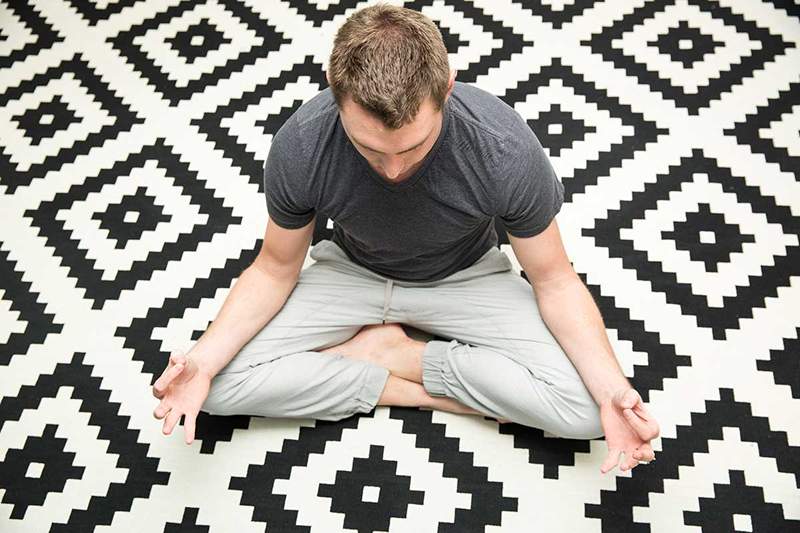Mindfulness how meditation abuse can increase anxiety in some cases

- 2891
- 937
- Lorenzo West I
Meditation abuse can increase anxiety in certain cases. Meditation is a practice that today is very promoted, but is it always beneficial?
In some cases, meditation can provide benefits, but this does not happen in all cases, because there are those who have stated that, in principle, they managed to focus their attention on breathing and then felt full of vigor and energy. However, in other cases, the session ended and the person felt much worse than when he had started.
Well, Instead of relaxing, his heart accelerated and his mind was filled with memories and feelings not pleasant, ending for feeling hopelessness and failure.
Therefore, there are those who practice meditation only occasionally, to prevent these unpleasant events from being repeated.
Content
Toggle- Meditation, use or abuse?
- Harmful effects of meditation abuse: dissociation
- Conclusion
- Bibliography
Meditation, use or abuse?
Of course, this is not the case of a single person, but that of many, because, up to 25 % of those who meditate have experienced adverse effects that can range from depression to panic attacks, restlessness, and even dissociation.
Given this, there is a question of how it is possible that something that has been sold as a miraculous cure, ends up generating disturbing effects for some people.
However, it should be noted that in the practice of mindfulness There are different techniques. Some of them are focused on conscious breathing, body scan and others that facilitate connecting with this.
Thus, The practice of meditation leads the person to contact their feelings, which is favorable, especially if you want to make accurate decisions.
In other meditation practices, an "observation awareness" is also promoted, in which the person trains to observe their thoughts and feelings without issuing any kind of judgment or reaction. This can help win emotional regulation, especially for those who suffer from outbursts of anger.
All These benefits are possible to achieve, as long as the practice is carried out in moderation and balance.
Unfortunately, some meditators exceed the limit and reach the point of feeling anguish.
For example, in the case of body scan, greater activity is activated in the island cortex, which leads to the intensity of emotions to increase then, the state of sensitivity could become something overwhelming and take the person to suffer until panic attacks.
Harmful effects of meditation abuse: dissociation
In the case of other meditators, the results may be different, as they run the risk of increasing their activity in the dorsolateral prefrontal cortex, which regulates the limbic system and the amigala.
In these cases, When the limits cross, all emotions can be null, And the person no longer feels happiness or joy for almost anything.
This situation of abuse of meditation leads some practitioners to experience a disturbing sensation of dissociation, expressing that they cannot feel anything, not even love for their family.
These are extreme reactions, but Meditation abuse can also have adverse effects on sleep, since its quality is affected.
To understand it better, It can be equated with the use of drugs, Like coffee, for example, which can increase the state of alert and concentration, but when the extreme is reached, then the person can feel anxiety, insomnia and panic, since there is a neuroanatomic and neurochemical overlap that affects the system of cerebral attention and excitement.
Conclusion
Of course, we must not forget that meditation can produce positive effects on many people, but the studies carried out have only been carried out for little space and, in the case of the negative effects caused by the abuse of meditation, These may arise later.
Today many experts care because there are people who practice meditation daily and estimate that for a couple of weeks it would not be bad, but meditation abuse could bring with them adverse effects.
Notably, In addition to meditation, there are other options that can be healthy and bring the person to feel well -being, such as physical exercise, for example.
Those who still enjoy meditation could also consider other techniques, since there is a wide range of them, especially in some religious traditions, which can be better to relieve anxiety symptoms.
Many specialists consider that Focusing on a single strategy, such as conscious breathing or body scan, can be a wrong idea, So they encourage people to consider other alternatives.
But it is not just the technique, but also the appropriate dose, for each particular situation, thus avoiding the abuse of meditation.
What is meditation and what can you help you?
Bibliography
- Ahn, j. AND. Meditation Sickness. In The Oxford Handbook of Meditation.
- Rodríguez Fernández, M. Yo. (2015). Study on "adverse effects" related to meditation.
- Trujillo, r. G., Monterrey, a. L., & de Rivera, J. G. (1992). Meditation and psychosis. Psyche, 13(2), 75-79.
- Walsh, r. N. (1980). Evolution and state of meditation studies. More ego.
- « Intelligence and happiness What is your relationship?
- Honjok South Korean movement that claims loneliness »

